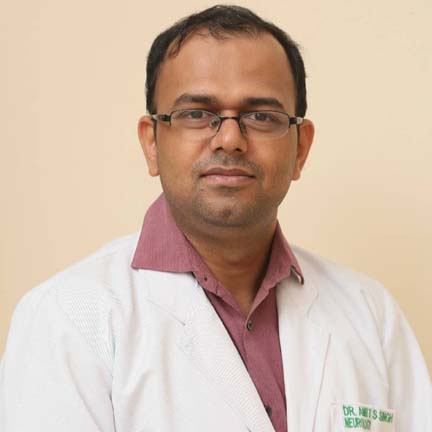About 70-80% of those affected by dementia are diagnosed with Alzheimer’s disease: Dr. Amit Shankar Singh
3 min read
Mohali, September 21, 2023: As old age progresses, dementia, also termed as the disease of forgetfulness, becomes synonymous with the elderly. However, the occurrence of dementia is not limited to age alone. Alzheimer’s disease is the most common form of dementia and about 70-80% of those affected by dementia are diagnosed with the disease. To raise awareness on Alzheimer’s disease and remove the misconceptions surrounding it, World Alzheimer’s Day is observed on 21st September every year. The theme of World Alzheimer’s Day-2022 -Know Dementia, Know Alzheimer’s — laying emphasis on the warning signs and diagnosis of the medical condition.
Dr Amit Shankar Singh, Consultant, Neurology, Fortis Hospital Mohali, in an advisory explains the causes, symptoms, prevention and treatment options of Alzheimer’s disease.
What is Alzheimer’s disease?
It is a neuro-degenerative disorder of the brain that causes the brain to shrink (atrophy) and brain cells to die. The disease is characterized by a decline in the cognitive abilities of an individual such as learning, memory, language, attention, motor and social skills. And due to these, there is drastic effect in daily activity of life of the patient.
Magnitude of problem: 1 in 3 elderly succumbs due to Alzheimer’s or another dementia. It kills more than breast cancer and prostate cancer combined, therefore it’s important to understand the disease and create awareness about the disease.
Causes
Even as the causes of Alzheimer’s remain unclear, genetic inheritance is one of the prime causes of the disease. It is also caused due to the abnormal deposition of proteins — amyloid protein and neuritic plaques — in the brain, thereby causing the brain cells to die. People above 65 years of age are more likely to be affected by Alzheimer’s. The incidence of the disease is also higher in women compared to men.
Symptoms
The warning signs of Alzheimer’s disease that are easily identifiable are as follows:
· Memory impairment: Memory impairment is the initial symptom of this disease. Dementia sets in and there is progressive deterioration in memory. This leads to difficulty in thinking, reasoning and understanding.
· Behavioural changes: Patients affected with Alzheimer’s disease exhibit symptoms such as depression, confusion and inability to concentrate. They tend to become unaware about their surroundings.
· Difficulty of language, speech: Alzheimer’s disease causes problems with speech. Those affected are unable to convey the meaning of things and are unable to understand, thereby causing confusion.
· Unable to complete daily tasks: Patients have slowed thinking and this effects their cognitive abilities. Alzheimer’s disease increases an individual’s dependency on others as they are unable to communicate their needs.
Diagnosis
Alzheimer’s disease should be suspected in any older adult with a progressive decline in memory. Neurologists conduct brain imaging, diagnostic and mental ability tests etc. to detect the disease. These helps to identify the possible causes of brain impairment.
Prevention
Shedding light on Alzheimer’s disease, Dr Shankar, said, “Even as there are no proven ways to prevent the disease, regular physical activity, meditation, balanced diet, maintaining healthy weight and keeping blood pressure under control help to keep the brain healthy.”
Prevention strategies:
Engage in regular cardio-vascular exercises, this helps in delaying cognitive decline.
Education is a very important tool for prevention of cognitive decline, therefore people with higher educational qualifications are less affected.
Quit smoking, alcohol, or any other type of addictive substance.
Avoid stress by counselling, developing problem solving attitude and yoga/meditation
Take care of cardiovascular risk factors like diabetes, hypertension, and obesity.
Eat healthy, as diet is considered as one of the most important reasons of cognitive decline, even in young patients.
Adequate sleep is important for recruitment and compilation of memory signals in neurons, therefore 6-8 hours sound sleep should be taken.
Dr Shankar further said, “It should be kept in mind that Alzheimer’s is not a normal part of aging. A few medications help in controlling the symptoms of the disease. Along with medication, family support, physical and cognitive rehabilitation are an integral part in the management of the disease.”
With advancements in technologies, scientific community is trying to find the cure of this disease and very promising drugs in clinical trials will soon be approved for this purpose.




